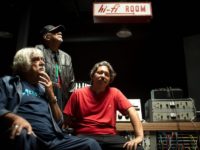Sure, the first recorded stirrings of Brazil’s most important jazz fusion band has historical significance. But beyond that, Azymuth’s Demos (1973-75) Volumes 1 & 2 also present a quartet that was preparing to launch its innovative ‘Samba Doido’ (crazy samba) brand that rocked contemporary Brazilian music, establishing that country’s own unique mark on the worldwide jazz-rock movement that dominated jazz throughout the 70s and into the 80s.
Keyboardist Jose Roberto Bertrami, electric bassist Alex Malheiros, drummer Ivan Conti and percussionist Ariovaldo Contesini were already veterans as session musicians for the biggest music stars in Brazil and serving as the backing band for bossa nova pop giant Marco Valle. Bertrami was additionally arranging and composing for major labels. No, these demos aren’t the product of musicians still finding their way and learning their craft, they already knew what they were doing and where to go with their vision.
Recorded at Bertrami’s home studio over the two years leading up to their self-titled debut, the recordings lack the polish of even that relatively unvarnished first album, but they were also fully realized arrangements with nothing terribly crappy about the audio condition; matter of fact, they are plenty acceptable. The light production touch positioned these recordings closer to a “live” aesthetic than any of their other studio output. But even from these rudimentary beginnings, Bertrami was armed with practically all the electronic keyboard tools available in the mid-70s: Moogs, Arps, Fender Rhodes, clavinet, Hammond B3…not unlike Corea’s and Hancock’s arsenals at the time.
The other guys were cutting edge in their own ways: the relentlessly cycling rhythm of “Prefacio” is a helluva showcase for Conti, whose inexhaustible energy steals the show, though Bertrami puts up a good fight on his B3. But then Conti’s heroics here are surpassed by his James Brown break beats on “Castelo” and Bertrami’s clavinet is the perfect complement. Malheiros plays a wildly rangy bass line on the funky stomper “Melô da Cuica,” an early peek into his cutting edge prowess that would soon capture people’s attention.
As the only chordal player in the band, Bertrami’s importance to the group’s sound is self-evident. Underpinned by a hypnotic Malheiros bass figure, Bertrami shows off good chops on “Laranjeiras” on organ, Rhodes and finally, a wah-wah’d clavinet. The spicy mixture of these modern (at the time) instruments and the Conti/Contesini Brazilian rhythms lies at the heart of what Azymuth was inventing during these sessions.
“Equipe 68” is another example of the disruption that was to come. It might have fit on a Return To Forever (Mk 1) album but Conti is bursting at the seams and Bertrami surprisingly uncorks a nasty-assed synth eruption at the end.
Only a handful of the songs here ended up on ‘proper’ Azymuth albums (“Prefacio,” Xingó” and “Manha”), bestowing a valuable window into not only formative arrangements of already known compositions, but formative compositions themselves. The infectious melody “Manha” is actually the demo track that finally got Azymuth a record contract and the lone song that ended up their self-titled release (titled as its English name “Morning”). Bertrami’s signature samba-dancing Rhodes is in full glory here, and Malheiros’ harmony bass lines can’t be ignored, either. Running at nearly twice the length of the “official” version, it’s only moderately less smooth, and features way more of Bertrami’s electric piano.
While elements of funk, samba and even prog rock inform this intoxicating blend of styles, jazz remains the primary underpinning of it all. Bertrami’s Rhodes becomes the feature item on “Xingó” and in a jazz trio exchange with Conti, embarks on a delightful excursion that is straight up, acoustic samba-kissed jazz at its core; it just so happened to be played with electric instruments.
In spite of a unified, congealed sonic imprint, this collection doesn’t suffer from the sameness syndrome, and there are several detours from their recognizable funk workouts. “Unknown song for Mario Telles” is a sweet, Rhodes-caressed ballad. An itchy groove sets “Duro de Roer” into orbit, a perfect backdrop for a chase scene in a police detective movie of the era. The slow jam “Tempos do Paraná” is a fetching weave of a glowing Rhodes with a rubbery electric bass. “Bateria do Mamao,” or “Drums of Mamao” (Mamao is Conti’s nickname), is just a straight up hard groove meted out solely on drums, leaving no doubt that Conti could handle the void that would soon be left behind when Contesini pulled out of the band after release of the 1975 debut.
Bertrami had been an early master of the Moog and though the B3 is dominant on “Juntos Mais una Vez,” it’s his synth aside that proves to be the high point of that song. That track is found near the back end of the collection, alongside alternate versions of “Xingó” and “Castelo” that are matches for the former renditions.
Far from this being a quick cash-in, Demos is a quality expansion of the sparse, pre-1979 hit “Jazz Carnival” discography. Now we can be certain that Azymuth was destined from before their first album for the international success that awaited them.
The double-disc Demos (1973-75) Volumes 1 & 2 is poised for release on May 31, 2019 by Far Out Recordings.
- Matthew Shipp – ‘The Cosmic Piano’ (2025) - June 17, 2025
- Ivo Perelman & Matthew Shipp String Trio – ‘Armageddon Flower’ (2025) - June 16, 2025
- Claudio Scolari Project – ‘Bloom’ (2025) - June 12, 2025



